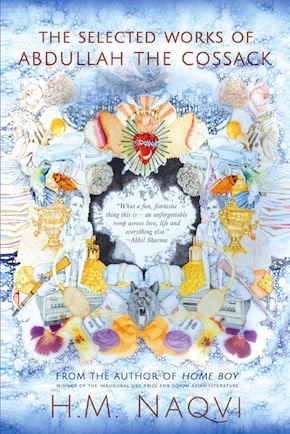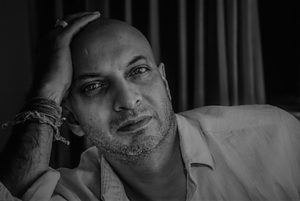All through the night
by H.M. Naqvi
“Touching on the metaphysical, the moral and the absurd, this bawdy epic is a fresh-voiced testament to place, family and the importance of loyalty.” Publishers Weekly
H.M. Naqvi’s The Selected Works of Abdullah the Cossack draws a portrait of modern Karachi via the crumbling body and soul of a 70-year-old man who is pondering the city’s past from the viewpoint of a dilapidated family estate. His wistful daydreams of jazz clubs, cabarets, Sufi festivals and visiting Soviet officials are broken when an unexpected love interest crosses his path, and the local land mafia begins to encircle him.
Where are you now?
By the sea, in Karachi, figuring out where I go from here.
Where and when do you do most of your writing?
I work through the night till about five in the morning. After waking at midday, I perform some light exercise then breakfast at three. I work from half three till about seven in the evening, take a short nap and knock back a peg of whatever I can find. I lunch at half nine, listen to some jazz, some qawwali, before returning to work circa midnight.
If you have one, what is your pre-writing ritual?
Cracking my fingers, massaging my temples.
Full-time or part-time?
Full-time, unfortunately. I need to find a job because earnings from the writing life are meagre. Are you hiring?
Pen or keyboard?
I think my handwriting has regressed to kindergarten level – I often can’t read it myself. Keyboard it is.
How do you relax when you’re writing?
When writing, I can’t relax – I’m on. But when I need to relax, I cook. When you’re trying to slice garlic so thin that it melts in the butter, you don’t think about anything else in the world. Ping-pong also works.
How would you pitch your latest book in up to 25 words?
I’m not really privy to the business side of things, but I suppose I can take a stab at sketching the first scene:
Abdullah the Cossack, a three-hundred-and-something-pound bachelor and scion of a prominent business family that has fallen on hard times, wakes one afternoon to realise he has turned seventy so considers launching himself from his balcony because he feels he has led a fallow life, but what gives him pause is the gaze that bores into his soul through the interstices of the trees that border his estate. It’s a love story, a comedy, but fundamentally it’s about somebody like me, like you, somebody looking for something, anything that will imbue his life with a modicum of meaning.
Sorry, I failed.
Who do you write for?
I have to inhabit the world I create for four, five years. I wish I could put out books faster but can’t. Consequently the work has to, for starters, work for me.
Who do you share your work in progress with?
Civilians, mostly – a friend who does not write and a friend who does not read. Sometimes I dispatch a cut to a fellow novelist, and then there’s my diligent agent.
Which literary character do you wish you created?
Oh, so many. Falstaff, Prospero. How about Henry Scobie? And Biswas, not to mention that Patriarch in Autumn of the Patriarch. I could go on and on, but I have my own to write.
Share with us your favourite line/s of dialogue, poetry or prose.
My sensibilities keep changing as I change, evolve. Consequently, I don’t think I could commit to any line at this juncture of history because it might change tomorrow, the day after. And I hope to keep evolving till I’m dead.
Which book do you wish you’d written?
Moby-Dick.
Which book/s have you most recently read and enjoyed?
Jim Harrison’s wise and poignant memoir Off to the Side, and about half of the first volume of Steven Runciman’s magisterial trilogy A History of the Crusades.
What’s on your bedside table or e-reader?
I don’t read in bed so actually don’t possess a bedside table. Reading stirs me, doesn’t put me down – there are drugs for that. But the books stacked on a nearby Ottoman include, in no particular order, Nadine Gordimer’s A Guest of Honour, Isambard Wilkinson’s Travels in a Dervish Cloak, Sarmila Bose’s Dead Reckoning, Norman Rush’s Mortals, Jose Padua’s A Short History of Monsters, Bernard S. Cohn’s Colonialism and Its Forms of Knowledge, Lawrence Norfolk’s The Pope’s Rhinoceros. I don’t know if I will read them all through, or any – several have been lying around for years.
Which books do you feel you ought to have read but haven’t yet?
Proust’s À la recherche du temps perdu and Qurratulain Hyder’s Aag ka Darya.
Which book/s do you treasure the most?
Those gifted by friends, of course.
What is the last work you read in translation?
Bilal Tanweer’s translation of Muhammad Khalid Akhtar’s Love in Chakiwara and Other Misadventures. It’s funny as hell.
Which story collections would you particularly recommend?
Off the top of my head, Saadat Hassan Manto’s Kingdom’s End and Rick Bass’s The Watch. The former’s ‘A Wet Afternoon’ is at once a subtle and dramatic composition, and the latter’s ‘Cats and Students, Bubbles and Abysses’ is an all-time favourite. I think I’ll read it again today.
What will you read next?
See above.
What are you working on next?
A funny, fantastic book that contends with love and life and death.
Imagine you’re the host of a literary supper, who would your dinner guests be (living or dead, real or fictional)?
One would resurrect Melville, of course. (I recently pilgrimaged at Arrowhead, by the way, and sat in the chair that had a view of the hills that, the story goes, recalled the contours of a whale.) There’s also Ghalib, one the greatest modern poets – a contemporary of Melville’s incidentally. There’s just nobody like him. And Borges, maybe. I actually think we would all get along. I’d probably cook them karahi – Pakistani stir-fried chicken. The Selected Works of Abdullah the Cossack features the recipe.
If you weren’t writing you’d be…?
If I were a better man (and had a head configured for the sciences), I think I would have been a doctor – how wonderful would it be to allay somebody else’s pain?
 H.M. Naqvi is the acclaimed author of Home Boy, which won the inaugural DSC Prize for South Asian Literature in 2011. He has worked in the financial services industry, taught creative writing at Boston University, run a spoken word venue, and appeared on CNN, National Public Radio and Bloomberg TV. He is currently Visiting Professor at the Lahore University of Management Sciences (LUMS). The Selected Works of Abdullah the Cossack is published by Grove Press in hardback and eBook.
H.M. Naqvi is the acclaimed author of Home Boy, which won the inaugural DSC Prize for South Asian Literature in 2011. He has worked in the financial services industry, taught creative writing at Boston University, run a spoken word venue, and appeared on CNN, National Public Radio and Bloomberg TV. He is currently Visiting Professor at the Lahore University of Management Sciences (LUMS). The Selected Works of Abdullah the Cossack is published by Grove Press in hardback and eBook.
Read more
@HMNAQVI

